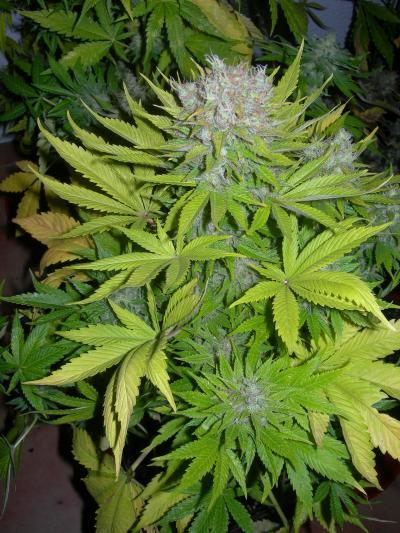
Cannabis and cancer: More patients going public with pot passions and practices

Life after cancer had crumbled into a daily dose of nerve pain for Dorry Clay. Chemo halted the disease but left her with the lingering sensation of pins jabbing her body from feet to face.
She was miserable. Then, she tried medical marijuana.
Clay, 55, got a prescription. She paid $50 for an eighth of an ounce of cannabis at a Connecticut dispensary. She vaped some at home. She was skeptical — until she felt the embers of a smile and a revelation.
“I could be happy again,” said Clay, diagnosed with breast cancer in 2010. Her treatment caused neuropathy — nerve damage associated with a prickling feeling and numbness. “The marijuana is soothing. It helps me bear the pain. With this stuff, I don’t think about dying. My husband likes to say it brought me back.”
Many cancer patients and survivors, like Clay, are publicly espousing cannabis. Some have done full 180s on the issue.
BoingBoing editor Xeni Jardin wrote that medical marijuana “saved my life” after a breast cancer diagnosis; this, after she'd long scoffed at its medical value. And former nurse Jeanette Bokland, 54, acknowledged reluctantly using medical pot — smuggled from Colorado — as an illegal part of her breast cancer regimen in 2014; now, she’s advocating for approval of prescription cannabis in Florida.
Medical marijuana is allowed in 23 states. Recreational marijuana is legal in Washington, Colorado, Alaska and Oregon plus the District of Columbia.
Of course, puffing joints to try to soften the effects of cancer or its treatments — like pain and nausea — has long been a secret regimen for some. But the shifting legal landscape has emboldened more cancer patients to consult with their physicians about weed, some doctors say.
“People are asking more often about it. They feel more comfortable saying they use,” said Dr. Steven Pergam, director of infection prevention at Seattle Cancer Care Alliance, or SCCA, and an infectious disease researcher at Fred Hutchinson Cancer Research Center.
Questions ... and more questions
“Legalization has changed the conversation. When somebody asks me: ‘Did you vote for the [Washington] marijuana law?’ I say I did because I don’t think it’s something that needs to be super regulated," Pergam added "But I think we need to use it judiciously. The question really is: How do you do that while protecting patients and then giving them access to the potential benefits that there may be?
“I want to understand the use patterns so I can give people constructive advice. If patients wanted to use it, what are the best ways to be protected? But I don’t think we know any of this data yet.”
That absence of evidence is due to the federal classification of marijuana as a Schedule 1 substance along with heroin and LSD. Drugs in Schedule 1 have “no currently accepted medical use,” U.S. authorities assert. Marijuana also remains federally illegal.
The designation essentially creates a federal monopoly on the marijuana that researchers need to study the plant’s medical potential. There is one U.S.-sanctioned pot garden — at the University of Mississippi. It’s managed by the National Institute on Drug Abuse and produces the only cannabis that’s available for federally sanctioned marijuana studies.
So, what does that leave doctors who want to answer their patients’ pot questions? Mostly: More questions.
Does pot ease side effects of cancer or its treatments?
There are scattered scientific scraps on the possible benefits of cannabinoids — marijuana compounds better known as THC, (the substance that makes people feel high) and CBD, (the chemical thought to relieve pain, nausea and inflammation).
In late June, the Journal of the American Medical Association published a meta-analysis of 79 randomized trials covering more than 6,400 participants that found moderate-quality evidence to support the use of cannabinoids for treating chronic pain. The same JAMA scrutiny found low-quality evidence that cannabinoids ease nausea from chemotherapy.
Could marijuana treat cancers?
The National Cancer Institute cites a study of rodents that found cannabinoids could have a protective effect against the development of certain types of tumors.
The U.S. Food and Drug Administration hasn’t approved marijuana as a cancer treatment.
“This whole topic is déjà vu all over again,” said Dr. George McDonald, a Fred Hutch clinical researcher and a gastroenterologist who practices at SCCA.
Medical history is laced with remedies that started with various plants. They were replaced by the active components of those same plants — and, ultimately, superseded by more-potent synthetic versions of those active components, McDonald said. Eventually, those synthetics were supplanted again by better-targeted medicines.
“One of the last uses of dried plant material in modern medicine was the … digitalis leaf, which was ground up from the plant as a medicine for heart failure,” McDonald said. The leaf was still “in use by the 18th century and still prescribed in my medical lifetime then replaced by digoxin then [again] replaced … by more effective drugs.”
Is medical marijuana safe for people with cancer?
Leaves can grow mold. Marijuana buds can, too, according to tests performed on 600 samples of Colorado retail weed. The results, reported in March, found some cannabis flowers were coated with up to 1 million fungal spores.
Microbes can get sucked into lungs when people smoke pot, doctors say. In other words, burning one end of a joint doesn’t kill all the bugs in the bud. There are documented cases of lung infections directly related to people who puffed dirty weed.
“Medical marijuana is in the Middle Ages, or perhaps the Dark Ages, of its development as a medicine,” McDonald said. “It is a non-sterile product, full of fungal organisms that are potential threats to patients with weakened immune systems, whether smoked or ingested.
“Thus, like digitalis leaf, medical marijuana may offer some clinical benefit but also poses risk,” he added.
“Count me skeptical with regard to medical marijuana.”
But cautious, careful doctors aren’t likely to sway many pro-pot patients to drop their cannabis routines.
For some cancer survivors like Dorry Clay, the availability of medical marijuana is a sacred freedom.
The federal blockade on research, she argues, must end to stop unnecessary suffering among people like her.
“With this pain, this is a human rights issue,” said Clay, who obtained a medical cannabis license last November in Connecticut. To reduce her neuropathy, she munches edibles, vapes marijuana or swallows cannabinoid pills.
“The futility of trying to survive in this country while you have a debilitating medical condition, it’s very mean,” she said. “It would be great if it could be legal, if people could stop flipping out, so it could be studied. A person could have a tiny bit of this and they might relax and get through the day and not cry. That’s all.”
Bill Briggs is a Fred Hutch News Service staff writer. Previously, he was a contributing writer for NBCNews.com and TODAY.com, where he was responsible for breaking news and covering trends in business, health and the military. Prior, he was a staff writer for The Denver Post and part of the newspaper's team that earned the 2000 Pulitzer Prize for breaking news coverage of the Columbine High School massacre. He has authored two books, including "The Third Miracle: An Ordinary Man, a Medical Mystery, and a Trial of Faith." Reach him at bbriggs@fredhutch.org.
Reprinted by permission from Fred Hutch
foto MarihuanayMedicina
licence cc by 2.0





